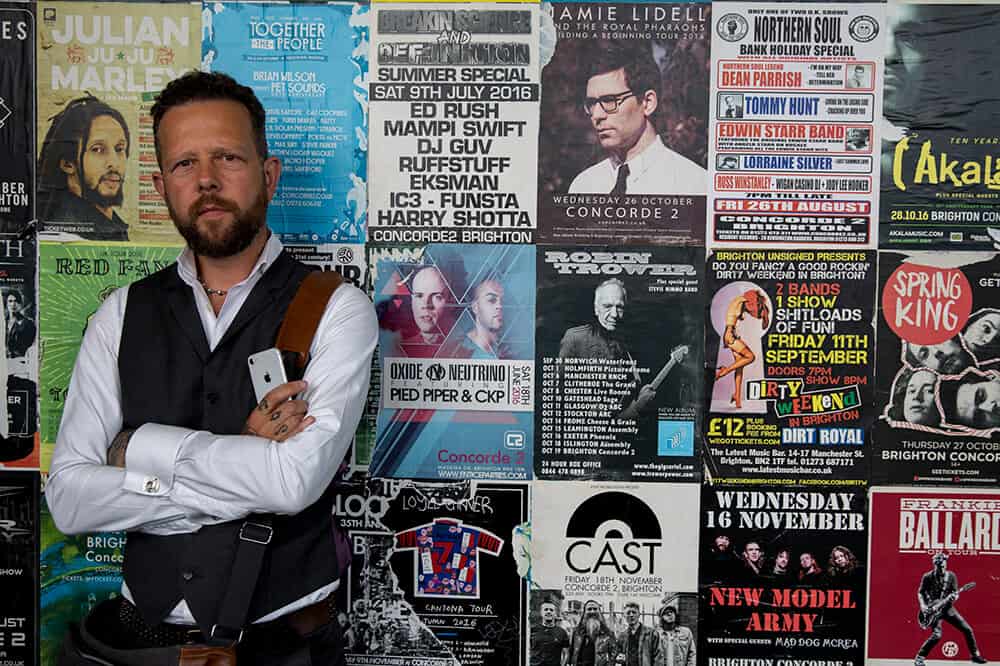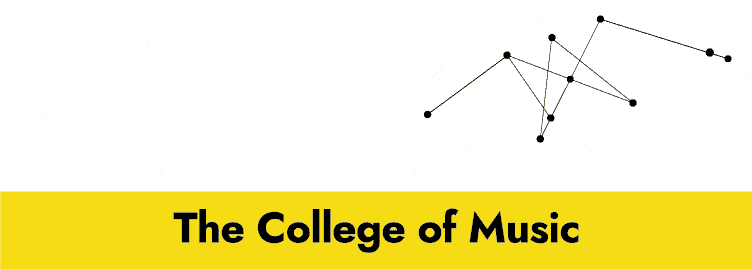JOIN US SEPTEMBER 2024 - APPLY TODAY OR BOOK YOUR PLACE ON ONE OF OUR OPEN DAYS IN BRIGHTON OR SHEFFIELD
JOIN US SEPTEMBER 2024 - APPLY TODAY OR BOOK YOUR PLACE ON ONE OF OUR OPEN DAYS IN BRIGHTON OR SHEFFIELD

There’s going to be a revolution in higher education. It’s going to be the end of the university as we know it, and many of our universities are totally unprepared for it. As I write this WaterBear have announced an exciting new partnership with Falmouth university. This is such an important working relationship for WaterBear.
Both institutions are deeply committed to quality and innovation. Innovation is the key word here. The Music Industry has changed and now Music education must do the same. And because I have this dual career in music and education, I want to compare the devastation that happened in the music industry between 2000 to 2013, with what’s about to happen in higher education. I’m going to explain how this could affect you, your friends and your families, and what you can do about it.
Now, this is the issue: the cost of the degree is going up, while the value of the traditional degree is going down.
It’s unsustainable.
At the same time, there’s been a huge swing in the power balance between universities and students. Universities used to have a relationship with students which was patriarchal, almost parental. Students were subordinated under the authority of the institution. Now we’ve gone the other way and the interaction is closer to that of ‘customer’ and a ‘service provider’.
Also, the key element of a degree course- i.e the ‘learning’ aspect - has become easily available and free. This is because we’ve all got the internet and we’ve all got phones. Nowadays we all have access to things like YouTube, and subscription-based courses via a google search that cost a few pounds a month. Because of the intense competition out there, some of the content on these courses is staggeringly good; it’s bang up to date and super personalised with one-to-one feedback. We also have access to YouTubers who are giving out amazing content, day in, day out, for nothing. This is the competition for learning now.
So, what’s the issue here? I mean, this is a good thing, right? This is democracy in action; we’re democratising knowledge and it makes university a choice. University is now just one of a number of choices for self-development.
The same thing is true in music. We don’t need record companies anymore. You can put out a record as D.I.Y. artists. We have phones and the internet, so we can reach our audience. Therefore, in 2020 getting a record deal is also just an option. As I said, most would agree that this is a ‘good thing’. So, where’s the problem?
The problem is that the need to change hasn’t got through too many of the universities yet, and the consequence of not taking this seriously is that the majority of universities are persisting in the business of selling knowledge for a lot of money. Politicians and the establishment have created a situation where this product is very expensive and student support is thin on the ground. But the worst of it is that they’re asking the customers to buy and consume the learning in the least convenient way possible.
Universities package up this product called ‘a degree’ and ask the customer to move to a new city, pay for accommodation, be given a product that’s one-size-fits-all, and work to a timetable that suits an institution. Students are expected to do this and endure the costs for three years. You add it all up and what we’re asking people to do is almost impossible in many cases. It’s not sustainable. It’s not how the world works anymore.
Nearly all the students that we work with tend to have to have a job as well, so they’re really busy. Many young people are burnt out and fed up of it, and it’s preventing older people with responsibilities from accessing higher education at all.
I think I know how this could pan out, because the music industry also had a high value product that suddenly become ‘free’ to consume. In 1994 I had a number 1 album with the band, and it was a brilliant time to be young and in the music business. The labels were manufacturing CDs for about 50p and they were retailing in the shop for more than £15 back then. It was the closest thing to printing money that you could imagine. It continued like this until about 1999 when suddenly file sharing started happening. This meant that anyone could share any amount of music with all their friends all day long. It was free, it was impossible to police and the value of music went from high to more or less nothing.
The music industry lost 80% of its business. Hundreds of billions of dollars over a couple of decades. Imagine what would happen if universities lost 80% of their revenue because the thing, they are selling has become devalued. Imagine what would happen to research activity which was subsidised by student fee income. Could it be that the university in your town in a few years could be a car park, a block of flats or a cinema? Nobody’s talking about this as a possibility. I don’t know why. It might be because no-one expects it to happen. But no-one in the music industry expected 90% of the major recording studios to close when music became free to share either, or they did.
Unless universities effectively train people for today’s environment and today’s workplace, the credibility of a degree won’t last much longer. Industries are changing much faster than education and many universities are not keeping up with real life. Degrees are reviewed and tweaked every three years. It’s just not good enough.
A lecture content must be reviewed the day you deliver it to make sure that it’s up to date. It stands to reason, because the landscape is changing so quickly. For lectures to be effective, the people delivering the lectures and designing the degrees have to keep their own professional practice up to date. This is because you have to be in the industry to understand it and to teach it. One can’t retire into education anymore. That’s why I’m planning a tour next year and I’m putting a record out the year after that. Unless I’m active in my practice, I’m no use to creatives or to new students.
On top of that, there’s an uncomfortable truth that people in education are resisting right now, but we’ve all got to face it. Our primary role is now one of content creating. The reason for this is that in the real world outside of the university, learning is taking place 24/7, on the consumers’ timetables. Learning can’t stop beyond the four walls of a classroom. We’ve got to create learning communities in higher education on trains, in hospitals, in the workplace, at home, in people’s flats, in coffee bars… because learning needs to be set free.
We must continue to evolve with the changes that present themselves. We musicians evolved when the music industry changed, and this is what happened:
10% year on year growth in recent years. We’re not selling any more CDs. Instead, we’ve innovated with live music, we’ve figured out how to monetise digital music and we’ve developed D.I.Y. income through direct relationships between fans and artists. Similarly, there are people dragging higher education kicking and screaming into the present day. There is good practice going on, there just needs to be more of it. WaterBear have recently partnered with Falmouth University. This is a great step for WaterBear and our students, because Falmouth University share our commitment to quality and innovation.
No one can change the world on your own and we are very fortunate to have such strong allies. This revolution is already happening. I’m here to remind you that going to university is a choice, in the same way that doing a record deal is a choice for an artist- a tool that they may use in their journey to get them from A to B. My question to you is this: are you going to passively hand over £27,000+ for a course that’s a generic, one-size-fits-all, out of date and not fit for purpose? Or are you going to take control of the future, choose wisely, and take the power back?
In the next blog I’ll be exploring how to make sense of the marketing messages, ask to right questions and find the right answers to make sure that you enrol on a course that is right for you.

- ‘Water bear’ is the common name for a Tardigrade.
- Tardigrades are micro creatures, found everywhere on earth.
- They are the most resilient creatures known.
- They can survive and adapt to their surroundings, even in outer space.
- Their resilience and ability to adapt and survive inspires us in everything we do. We love them.


WaterBear Education Ltd, Hanover House,
118 Queens Road, Brighton BN1 3XG, UK Map
Email: [email protected]
Tel: +44 (0) 1273 726230
WaterBear Sheffield, Unit 4, Gatecrasher,
49 Eyre Lane, Sheffield S1 4RB, UK
Email: [email protected]
Tel: +44 (0) 1143 992720

WaterBear Education Ltd, Hanover House,
118 Queens Road, Brighton BN1 3XG, UK Map
Email: [email protected]
Tel: +44 (0) 1273 726230
WaterBear Sheffield, Unit 4, Gatecrasher,
49 Eyre Lane, Sheffield S1 4RB, UK
Email: [email protected]
Tel: +44 (0) 1143 992720
- ‘Water bear’ is the common name for a Tardigrade.
- Tardigrades are micro creatures, found everywhere on earth.
- They are the most resilient creatures known.
- They can survive and adapt to their surroundings, even in outer space.
- Their resilience and ability to adapt and survive inspires us in everything we do. We love them.
